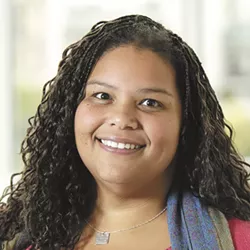When I first watched Mary Poppins as a wee thing, one song memorized me into silence. "Stay Awake" is a lullaby sung during a serene scene that stands in stark contrast to the shenanigans marking much of the movie. Mary sings Jane and Michael Banks to sleep by instructing them to do the opposite: "Stay awake, don't rest your head, don't lie down upon your bed, while the moon drifts in the skies, stay awake don't close your eyes." By the end of her melody, the children are lulled, duped ever so deeply into slumber. At my young age, I'd yet to possess the wherewithal to grasp why that particular song was so powerful, but little logic is necessary when the heart responds to something so naturally.
How does this prim, proper, practically perfect Poppins produce pragmatic results with such impractical advice? She understands human nature well — that we often act at odds with behaviors in our best interest. Mary has a way with words and capitalizes on our silly, stubborn streaks. She encourages autonomy, asking us to own all life's contradictory choices with an express acknowledgment.
After spending just a few hours in her world, I am forced to return to mine and marvel at how my recalcitrance remains a recurrent truth. There are countless ways I continue fighting rest — from mundane battles, like choosing healthier options, brushing my teeth at night or making my bed in the morning, to more serious matters, like chasing after the unavailable, getting mired in losses, or making upward comparisons. However, messages of hope spring eternal because Mary believes. Enunciating our potential perpetually improves our possibilities.
In her movie return, Mary Poppins reinvigorates opportunities for learning old-new lessons. Aside from a moving musical score, pretty pink and purple panoramas, awesome alliteration, and toe-tapping throwback choreography, this revival brims with nuggets of knowledge, carefully crafted building blocks of meaning. The movie doesn't shy away from or shade over hard truths but searches for integration by confronting the pain we're likely to endure in this life. Loss, for example, brings a sadness that can slay, but perspective ("you see when the world turns upside down the best thing is to turn right along with it") plays an important role in determining whether we stay down — "some others bear an anchor and they sink in seconds flat" — or become buoyant, rising up "to polish the sky."
We're warned against getting stuck in the past — "too focused on where you've been to pay attention to where you're going." We are to "let the past take a bow, the forever is now." We're admonished, in absolutes, about forgetting the permanence and persistence of love — "nothing's gone forever only out of place." We are to "hold on tight to those you love." We're reminded that "we're going to need a lot of help," that we should each "enjoy the things you've got... and never try to be the person that you're not," and that "a cover is not the book, so c'mon and take a second look." And in a nod to "Stay Awake," "Can You Imagine That" mirrors the tradition of bombastic rhetoric, poking fun at excessive intellect and logic, which excludes wonder — "too much glee leaves rings around the brain, take that joy and wash it down the drain."
Fiddle-faddle and folderol, I'm over-analyzing again. I've wasted enough time exaggerating and extrapolating on the wisdom one can derive from whimsical fantasy. Far too many pressing problems are prevalent in our present reality, so I really must stop projecting... (insert umbrella emoji, a mischievous smile and an indignant "can you imagine that?") End Scene. ♦
Inga N. Laurent is a local legal educator and a Fulbright scholar. She is deeply curious about the world and its constructs and delights in uncovering common points of connection that unite our shared but unique human experiences.






















